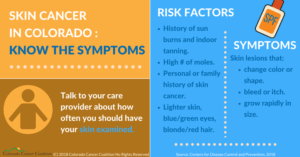Melanoma By The State: Colorado


In 1876, one hundred years after the signing of the Declaration of Independence, Colorado became the 38th state of the United States, hence its nickname: The Centennial State. One fun fact about the state is that the first license plate on a vehicle in the U.S. was issued in 1908 in Denver, Colorado. However, what Colorado is known for is its first-rate skiing and for having the highest mean elevation of any state, with more than one thousand Rocky Mountain peaks over 10,000 ft high and 54 towering above 14,000 ft.
“Because of our altitude and love of outdoor activities, Coloradans are exposed to a higher UV incidence than others throughout the rest of the country,” says Melissa Laughter, PhD, with the University of Colorado School of Medicine, Anschutz Medical Campus. “As a result, without the appropriate sun protection, Coloradans are at an increased risk of skin cancer.”
Despite increased public awareness, the melanoma rate has continued to steadily rise. According to the most recent data available on the Colorado Department of Public Health & Environment’s website, in 2000 there were 858 melanoma cases. In 2016, the total number of melanoma cases in Colorado was 1,290. The highest number of cases in 2016 was Jefferson County, with a total of 179 melanoma cases or 13.88% of the total cases in Colorado.
During the same time period, the number of deaths was 122 in 2000, peaked at 179 in 2010, and was 119 in 2016. In the spring of 2011, the U.S. Food and Drug Administration approved two new treatment options for melanoma, Yervoy (ipilimumab) and Zelboraf (vemurafenib).
Colorado Skin Cancer Task Force
The Skin Cancer Task Force is one of ten task forces under the Colorado Cancer Coalition implementing the Colorado Cancer Plan. The Skin Cancer Task Force’s mission is to increase awareness about sun safety and skin cancer prevention through community outreach and educational events, and to decrease rates of melanoma and keratinocyte carcinomas across the state of Colorado. Its members participate in approximately 15 events throughout the year. These events take place across the state and include public community events, employee conferences, school events, and fundraisers. At these events, task force volunteers conduct skin cancer checks, provide information on skin cancer prevention, distribute sunscreen, and educate participants on effective methods of sun protection.

In 2016, the University of Colorado School of Public Health received a two-year grant through the Cancer, Cardiovascular, and Pulmonary Disease Competitive Grants Program. The project’s goal was to reduce the incidence of melanoma and non-melanoma skin cancer in Colorado by increasing the use of sun protection and decreasing indoor tanning and other ultraviolet (UV) exposure behaviors among young adults attending colleges and universities in nine Colorado counties.
Ten college campuses partnered with the Colorado School of Public Health to reduce skin cancer risks. Campuses used the Reveal Imager, a camera that employs cross-polarized light to show melanin deposits that have accumulated under the surface of the skin.

In 2018, a Skin Cancer Task Force member in Grand Junction expanded on the success of using the UV Reveal Imager in Metro Denver and applied for a Colorado Cancer Fund grant to buy a camera. She screened over 800 people in Mesa County and also distributed over $9,000 in donated sunscreen and cancer information to those who stopped by to have their pictures taken.
The imager was used at various events, including student and staff health fairs, new student orientation, and athletic events. Additionally, students brought the imager to dorms. Campuses also created educational material and used social media to promote UV protection. One school ran PSAs during football games to remind spectators to reapply sunscreen.
The success of the imager helped to catalyze efforts to identify and address environmental and policy changes, which included planting trees, purchasing canopies, and creating permanent shade structures. One campus even applied to a foundation and received funding for eight sunscreen dispensers. This campus is using social media to let students know where the dispensers are located and to highlight the importance of UV protection.
One T-Shirt at a Time
 Bruce McCown, another Coloradan and Stage IV patient who is no stranger to raising awareness about melanoma, is getting his message out to the public in a different way. In 2014, Bruce was diagnosed with Stage III melanoma. While undergoing treatment, he had a vision, which would eventually help him bring meaning to his diagnosis. He gives credit to a tattoo artist for first helping him bring his image to life and also to a friend of his for putting the image on a t-shirt. Now Bruce, who has progressed to Stage IV, sells his t-shirts on the Sweet Tea Stitches’ website under the name Bruce McCown, and under the names of fellow warriors Mark Monero, Lisa McCain, and Kindle Stamps, who have lost their battles with melanoma. Part of the proceeds from the t-shirts goes to AIM at Melanoma to help fund its innovative research and other programs that support melanoma patients and their families. “I had to do something to remind people that there are people fighting for their lives every day. Melanoma is not just skin cancer,” says Bruce. “And I will keep doing what I can to help until we don’t lose any more lives to this beast of a disease.” View Bruce’s t-shirts at the following link: https://www.sweetteastitches.com/aimdonations
Bruce McCown, another Coloradan and Stage IV patient who is no stranger to raising awareness about melanoma, is getting his message out to the public in a different way. In 2014, Bruce was diagnosed with Stage III melanoma. While undergoing treatment, he had a vision, which would eventually help him bring meaning to his diagnosis. He gives credit to a tattoo artist for first helping him bring his image to life and also to a friend of his for putting the image on a t-shirt. Now Bruce, who has progressed to Stage IV, sells his t-shirts on the Sweet Tea Stitches’ website under the name Bruce McCown, and under the names of fellow warriors Mark Monero, Lisa McCain, and Kindle Stamps, who have lost their battles with melanoma. Part of the proceeds from the t-shirts goes to AIM at Melanoma to help fund its innovative research and other programs that support melanoma patients and their families. “I had to do something to remind people that there are people fighting for their lives every day. Melanoma is not just skin cancer,” says Bruce. “And I will keep doing what I can to help until we don’t lose any more lives to this beast of a disease.” View Bruce’s t-shirts at the following link: https://www.sweetteastitches.com/aimdonations
Indoor Tanning
Colorado is one of six states that has yet to pass any sort of legislation to restrict minors’ access to tanning devices. (The Colorado Revised Statutes does provide for the registration of all artificial tanning facilities, owner responsibilities, and enforcement measures. C.R.S. 25-5-1001.-25-5.011.) AIM at Melanoma, along with several members of the Colorado Skin Cancer Task Force, met with Representative Yadira Caraveo in the Fall of 2019 to discuss the importance of sponsoring legislation that would ban minors under 18 from indoor tanning devices. It is anticipated that Representative Caraveo will be introducing legislation in the 2020 legislative session. If you are interested in getting involved in this effort, please email Samantha Guild, Executive Director for AIM at Melanoma.
Recent Posts

A Conversation with Dr. Rena Szabo, PsyD on Empowering Patients

Empowering Women in Melanoma: A Look Inside the Women in Melanoma Initiative

Melanoma News and Highlights You Don’t Want to Miss

Coping with Cancer: DBT Skills for Emotional Resilience


